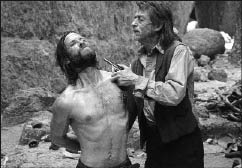Cave Heller
by M. Faust

Based on a script by Nick Cave, The Proposition is perhaps less violent and harrowing than any given song from a Cave album like Murder Ballads. But, as Cave fans will recognize, that’s an awfully high bar for comparison, and this Australian frontier story is more brutal than many viewers may be able to bear. If you find HBO’s Deadwood prissy, this is the movie for you.
American reviewers have invariably classified, or at least likened, The Proposition as a “revisionist western.” In fact the film is Australian to the core, dealing with that country’s own unique creation myth; that the milieu has much in common with the American west points out the universal tension between law and freedom, and the tendency of the strong to bully the weak.
The movie opens in Queensland of the 1880s with a shootout. Outlaw Charlie Burns (Guy Pearce) is captured along with his simple-minded teenaged brother Mike (Richard Wilson). Captain Stanley (Ray Winstone), the Englishman imported to act as lawman in the area, offers him a deal: Mike will be hanged in a few weeks unless Charlie finds and kills his older brother Arthur (Danny Huston), the real leader of the gang that has been terrorizing local settlers.
Because Cave and director John Hillcoat (who worked together on the 1985 prison drama Ghosts of the Civil Dead) have an aversion to the prosaic, The Proposition often leaves viewers searching for a place to locate their sympathies. The opening scenes tend to make us feel that Charlie and Mike are being unjustly accused by Stanley, whose vow that he will “civilize this land” paints him as a colonialist of the worst sort. But we’re confounded when Charlie’s search for his psychotic brother does not turn the film into a Down Under Heart of Darkness. We spend more time with Stanley and his wife Martha (Emily Watson), a delicate Victorian lady struggling to maintain standards in this harsh, unforgiving land. They are depicted not as overt fools but as decent people in a bad bargain.
As for Charlie, who has so little dialogue that one wonders if Guy Pearce suffered from laryngitis while filming in the outback, after a brief visit with a lunatic bounty hunter (played with scene-chewing brio by John Hurt), he is saved from death by native spear by brother Arthur, who turns out to have a poetic side equal to his reputed violence. (Huston steals the film with a performance that would have done his father John proud.) When they learn that the imprisoned Mike has been harshly treated, they ride out for vengeance, a scene you may not anticipate gladly given the grisliness of some of the scenes that have preceded it.
If nothing else, The Proposition is an uncompromising film. Hillcoat and Cave are unwavering in their vision of hellish life in a hellish land, captured with awful beauty by French cinematographer Benoît Delhomme. But unlike the anti-westerns of Sergio Leone or Sam Peckinpah, they leaven their story with neither cynical humor nor grudging respect. Perhaps the perspective we’re meant to come away with is that of the Stanley’s aborigine servant (played by the noted Australian actor David Gulpilil, star of Walkabout and Rabbit Proof Fence): Given the day off for the (to him) incomprehensible holiday of Christmas, he removes his boots and leaves them inside their gate before returning to the land.
|
Issue Navigation> Issue Index > v5n23: Greed and the Demolition of the H-O Oats Elevator (6/8/06) > Film Reviews > Cave Heller This Week's Issue • Artvoice Daily • Artvoice TV • Events Calendar • Classifieds |









 Current Issue
Current Issue